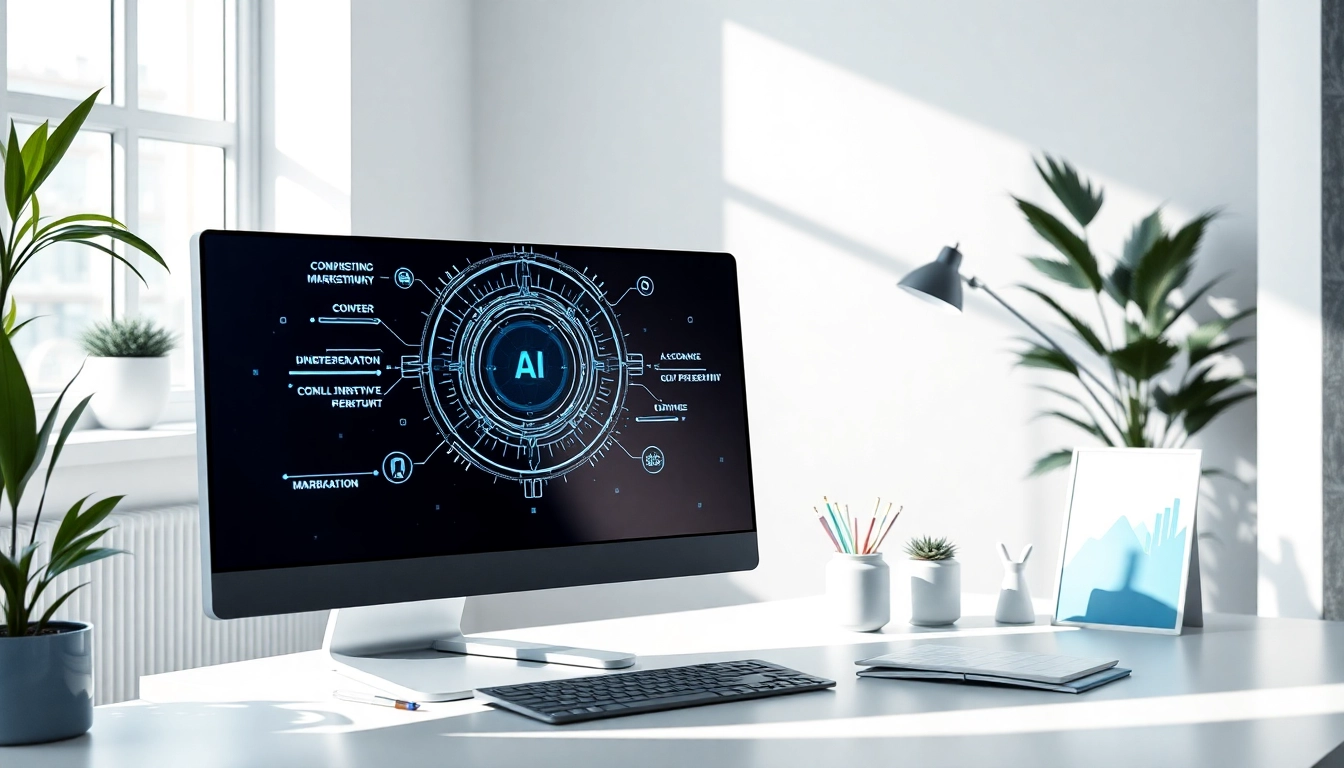Understanding AI Marketing Agents
What Are AI Marketing Agents?
AI marketing agents are software tools designed to automate specific marketing tasks using artificial intelligence. These agents can significantly enhance campaigns by leveraging large datasets to deliver tailored customer experiences, optimize marketing strategies, and streamline processes. While operating with some degree of autonomy, these AI-driven solutions require human oversight to ensure alignment with business goals and ethical standards. This combination of AI capabilities and human intuition enables businesses to harness the full power of AI marketing agents in transformative ways.
How They Operate in Marketing
AI marketing agents function by processing vast amounts of data more efficiently than human marketers ever could. They analyze customer profiles, behavior patterns, and market trends to generate insights that inform decision-making. Typical operations include customer segmentation, content personalization, predictive analytics, and performance optimization across various channels. By performing these tasks autonomously, AI marketing agents free up marketers to focus on strategy and creative work, thus increasing overall productivity and enhancing campaign effectiveness.
The Importance of Human Oversight
Despite their advanced capabilities, AI marketing agents are not infallible. Human oversight remains critical for several reasons. First, while AI can identify patterns, it lacks the nuanced understanding of human emotions and cultural contexts that are essential for crafting effective marketing messages. Furthermore, ethical considerations surrounding data privacy and bias must be carefully managed by humans who can interpret AI-generated insights in the context of corporate values and social responsibility. Therefore, a collaborative approach that combines the strengths of both AI agents and human marketers will maximize marketing effectiveness while ensuring ethical practices.
Key Benefits of Using AI Marketing Agents
Efficiency in Campaign Management
One of the primary benefits of AI marketing agents is their ability to significantly enhance operational efficiency. By automating repetitive tasks such as email marketing, social media posting, and customer follow-ups, these agents allow marketing teams to allocate their time and resources more effectively. For instance, AI can schedule and execute campaigns based on optimal timings gleaned from historical data, removing guesswork and maximizing engagement rates. Consequently, campaigns can be executed more swiftly, and adjustments can be made in real time based on AI-driven performance metrics.
Enhanced Customer Segmentation
AI marketing agents excel at customer segmentation by utilizing complex algorithms to analyze diverse customer data points. This enables brands to identify distinct customer segments, each with unique preferences and buying behaviors. By grouping customers according to these insights, marketers can create highly personalized campaigns tailored to each segment’s interests and needs. Such granularity not only enhances the likelihood of conversion but also fosters deeper customer relationships, leading to increased loyalty and repeat business.
Real-Time Data Analysis and Insights
The ability to gather and analyze data in real time is one of the most compelling features of AI marketing agents. They monitor multiple data sources—from customer interactions on social media to website analytics—offering marketers actionable insights as situations unfold. For example, if an email campaign underperforms, AI can quickly identify the cause and suggest adjustments. This agility allows businesses to pivot their strategies swiftly, optimizing marketing efforts while ensuring they remain relevant in an ever-changing market landscape.
Implementing AI Marketing Agents in Your Strategy
Choosing the Right AI Tools
When considering the implementation of AI marketing agents, choosing the right tools is crucial. Organizations should assess their specific needs and objectives to select AI solutions that align with their marketing strategies. Look for tools that offer robust functionalities, such as campaign automation, customer insights, and analytics capabilities. Popular AI marketing platforms include HubSpot, Salesforce, and Marketo, each providing distinct features that cater to various marketing requirements. Performing a thorough evaluation of these solutions will ensure that businesses invest in tools that truly enhance their marketing efforts.
Integrating with Existing Marketing Systems
Effective integration of AI marketing agents with existing marketing systems is essential for maximizing their potential. Compatibility issues can often arise, especially if legacy systems are in place. To facilitate a smooth integration, businesses should conduct a comprehensive audit of their current marketing technologies, identifying gaps and ensuring that the new AI tools can seamlessly interact with existing platforms. This includes connecting customer relationship management (CRM) systems, content management systems (CMS), and other marketing tools to create a unified ecosystem where data flows freely and insights are easily accessible.
Setting Goals and Measuring Success
Defining clear objectives is a fundamental step when implementing AI marketing agents. Organizations should establish key performance indicators (KPIs) that align with their strategic goals, enabling them to measure the success of their AI-driven initiatives. Common KPIs to track include lead generation, conversion rates, customer engagement levels, and return on investment (ROI) for individual campaigns. By consistently monitoring these metrics, marketers can make data-informed decisions and optimize their strategies for continuous improvement.
Case Studies: Success Stories of AI Marketing Agents
Impact on Small Businesses
Small businesses are increasingly turning to AI marketing agents to level the playing field against larger competitors. For instance, a local bakery leveraged an AI-driven social media marketing tool to target ads based on customer demographics and preferences. As a result, their engagement rates skyrocketed, increasing foot traffic by 30% within three months. This case exemplifies how small enterprises can utilize AI technologies to reach targeted audiences effectively and enhance their marketing efforts without significant budget increases.
Large Enterprises Leveraging AI
Large corporations, such as Coca-Cola and Unilever, have also begun deploying AI marketing agents to streamline operations and enhance consumer engagement. Coca-Cola implemented AI tools to analyze social media sentiment, allowing them to adjust marketing initiatives in real-time based on consumer perceptions. This agile approach not only improved brand image but also informed product development, tailoring offerings to meet customer demands. Such success stories highlight the scalability of AI marketing solutions across businesses of varying sizes and sectors.
Innovative Strategies from Leading Firms
Industry leaders are continuously exploring new and innovative strategies using AI marketing agents. For example, a leading e-commerce platform employed machine learning algorithms to personalize product recommendations based on individual user behavior. By dynamically adapting to users’ browsing history and purchase patterns, the platform improved conversion rates by 20%. Such innovative applications of AI not only enhance customer experiences but also drive significant business growth, setting a precedent for others to follow in the industry.
The Future of AI Marketing Agents
Trends and Predictions for the Industry
As technology continues to evolve, the future of AI marketing agents is promising. Key trends influencing this future include the rise of voice search, greater personalization, and the integration of augmented reality in marketing campaigns. With the proliferation of voice-activated devices, marketers must adapt to optimize content for these platforms. Meanwhile, the demand for highly personalized experiences will only intensify, requiring AI agents to gather deeper insights into consumer behavior. As these trends develop, businesses that proactively adapt will likely enjoy a competitive edge.
Preparing for AI-Driven Marketing Trends
Organizations should prepare for a future dominated by AI-driven marketing by investing in training and development. Marketers must equip themselves with the skills necessary to interpret AI insights effectively and leverage these technologies in their strategies. Continuous education through workshops, relevant certifications, and networking with industry leaders will help marketers remain ahead of the curve. By fostering a culture of innovation and adaptability, businesses can thrive in an AI-enhanced marketing landscape.
Ethical Considerations and Best Practices
The implementation of AI marketing agents also brings ethical considerations that must be addressed. Issues surrounding data privacy, bias, and transparency are prominent, necessitating guidelines and best practices for responsible AI use. Organizations should prioritize consumer consent and data protection while developing AI systems that are free from bias to foster public trust. Establishing an ethical framework for AI deployment will not only safeguard businesses against legal repercussions but also enhance their reputation among consumers. Continuous dialogue on ethical AI practices within the industry can also guide normative behavior and practice standards moving forward.



